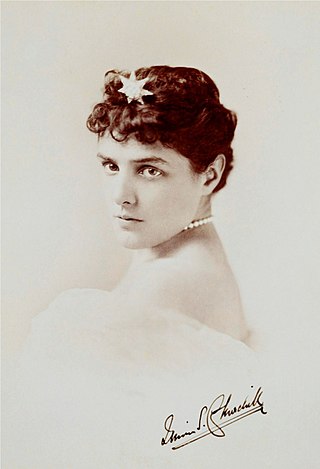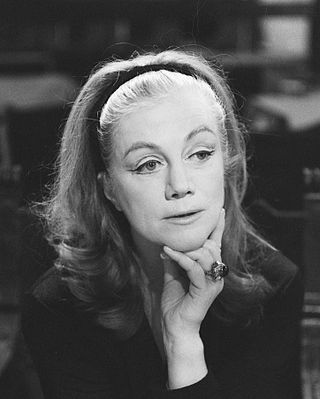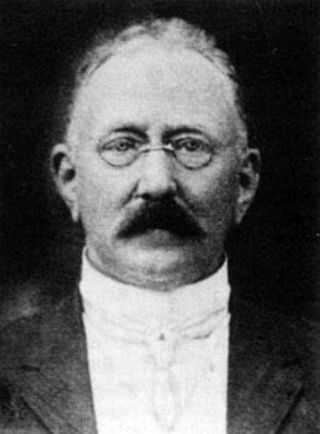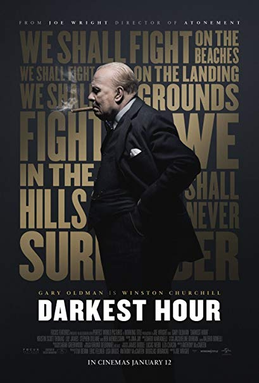See also
- The Last Lions, a 2011 African nature documentary film
The Last Lion may refer to:

Sir Winston Leonard Spencer Churchill was a British statesman, soldier, and writer who was twice Prime Minister of the United Kingdom, from 1940 to 1945 during the Second World War, and 1951 to 1955. Apart from 1922-24, he was a Member of Parliament (MP) from 1900 to 1964 and represented a total of five constituencies. Ideologically an adherent to economic liberalism and imperialism, he was for most of his career a member of the Conservative Party, which he led from 1940 to 1955. He was a member of the Liberal Party from 1904 to 1924.

USS Winston S. Churchill (DDG-81) is an Arleigh Burke-class destroyer of the United States Navy. She is named after Sir Winston Churchill, former Prime Minister of the United Kingdom. This ship is the 31st destroyer of her class and the 18th ship of be built at Bath Iron Works in Bath, Maine. Construction began on 7 May 1998, and the vessel launched and christened on 17 April 1999. On 10 March 2001, she was commissioned during a ceremony at Town Point Park in Norfolk, Virginia.

Jeanette Spencer-Churchill, known as Lady Randolph Spencer-Churchill, was an American-born British socialite, the wife of Lord Randolph Churchill, and the mother of British prime minister Winston Churchill.

Lord Randolph Henry Spencer-Churchill was a British aristocrat and politician. Churchill was a Tory radical and coined the term 'Tory democracy'. He participated in the creation of the National Union of the Conservative Party.
Winston Churchill (1874–1965) was a British statesman who led the United Kingdom and British Empire during the Second World War.

William Raymond Manchester was an American author, biographer, and historian. He was the author of 18 books which have been translated into over 20 languages. He was awarded the National Humanities Medal and the Abraham Lincoln Literary Award.

Clementine Ogilvy Spencer-Churchill, Baroness Spencer-Churchill, was the wife of Winston Churchill, Prime Minister of the United Kingdom, and a life peer in her own right. While she was legally the daughter of Sir Henry Hozier, her mother Lady Blanche's known infidelity and his suspected infertility make her paternal parentage uncertain.

Sarah Millicent Hermione Touchet-Jesson, Baroness Audley, was an English actress and dancer and a daughter of Winston Churchill.

"We shall fight on the beaches" was a speech delivered by the British Prime Minister Winston Churchill to the House of Commons of the Parliament of the United Kingdom on 4 June 1940. This was the second of three major speeches given around the period of the Battle of France; the others are the "Blood, toil, tears and sweat" speech of 13 May 1940, and the "This was their finest hour" speech of 18 June 1940. Events developed dramatically over the five-week period, and although broadly similar in themes, each speech addressed a different military and diplomatic context.

Young Winston is a 1972 British epic biographical adventure drama war film covering the early years of British Prime Minister Winston Churchill, based in particular on his 1930 book, My Early Life. The first part of the film covers Churchill's unhappy schooldays, up to the death of his father. The second half covers his service as a cavalry officer in India and the Sudan, during which he takes part in the cavalry charge at Omdurman, his experiences as a war correspondent in the Second Boer War, during which he is captured and escapes, and his election to Parliament at the age of 26.
Winston Churchill School, or variants, may refer to:

The Roaring Lion is a black and white photographic portrait of a 67-year-old Winston Churchill as Prime Minister of the United Kingdom. The portrait was taken in 1941 by Armenian-Canadian photographer Yousuf Karsh in the Centre Block on Parliament Hill in Ottawa, Ontario, Canada.

Jan Willem Boudewijn Gunning, was a Dutch physician, who served as the director of both the Staatsmuseum and what was then known as the Pretoria Zoological Gardens.

Named the Greatest Briton of all time in a 2002 poll, and widely regarded as being among the most influential people in British history, Winston Churchill has been regularly portrayed in film, television, radio and other media. The depictions range from minor character to the biographical centerpiece, exceeding 30 films, more than two dozen television shows, several stage productions, and countless books.

World War II: When Lions Roared is a 1994 American war television miniseries, directed by Joseph Sargent, and starring Michael Caine, John Lithgow and Bob Hoskins as the three major Allied leaders, Joseph Stalin, Franklin D. Roosevelt and Winston Churchill respectively. It was notable as the first video production to be produced in high-definition video for broadcast in the United States, using the Sony HDVS line of analog high-definition equipment, although it was broadcast by the NBC television network in standard NTSC resolution.
Elizabeth Ann Everest was Winston Churchill's beloved nurse and nanny, and an important figure in his early life.

Darkest Hour is a 2017 British biographical war drama film about Winston Churchill, played by Gary Oldman, in his early days as Prime Minister of the United Kingdom during the Second World War and the May 1940 war cabinet crisis, depicting his refusal to seek a peace treaty with Nazi Germany amid their advance into Western Europe. The film is directed by Joe Wright and written by Anthony McCarten. Along with Oldman, the cast includes Kristin Scott Thomas as Clementine Churchill, Lily James as Elizabeth Layton, Stephen Dillane as Viscount Halifax, Ronald Pickup as Neville Chamberlain, and Ben Mendelsohn as King George VI. The title of the film refers to a phrase describing the early days of the war, which has been widely attributed to Churchill.

Throughout his life, Winston Churchill made numerous controversial statements on race, which some writers have described as racist. It is furthermore suggested that his personal views influenced important decisions he made throughout his political career, particularly relating to the British Empire, of which he was a staunch advocate and defender. In the 21st century, his views on race and empire became among the most discussed aspects of his legacy. Some academics, such as Kehinde Andrews, go so far as to suggest Churchill was "the perfect embodiment of white supremacy", while others like historian Andrew Roberts, say that Churchill could certainly be accused of paternalism, but not race-hatred.
Portrait of Winston Churchill may refer to: